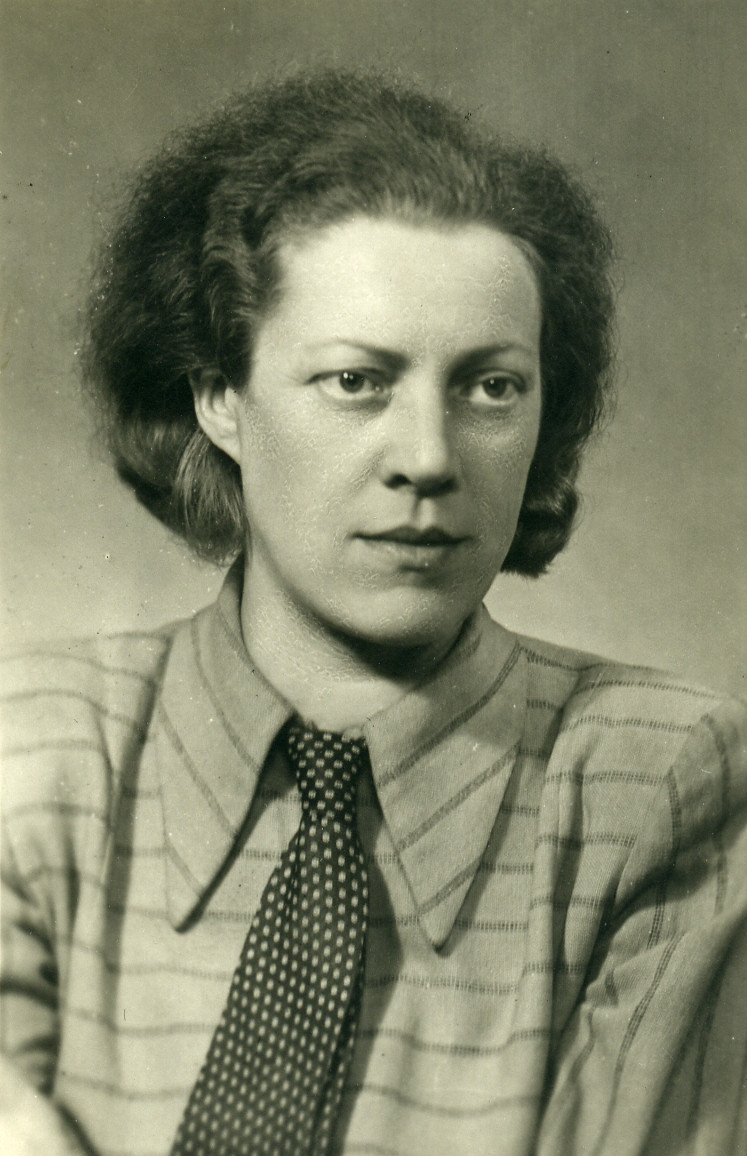
Aira Kaal
Aira Kaal (given name until 1938 Alma-Vilhelmine Kaal, from 1939 Aira Hone, also used pseudonyms Reet Uietu and Alma Kaal, 7. XI 1911 – 7. IV 1988) left her mark on Estonian culture as a sensitive nature poet and innovator in short prose.
She was born in Uuemõisa (later Pöide) parish on Saaremaa into a large family. Kaal attended Tornimäe and Uuemõisa primary schools, the Saaremaa co-educational Gymnasium and from 1931 to 1940 the University of Tartu, where her main subject was philosophy, with Estonian literature, world literature and English as subsidiary subjects. In her university years she published prose, poetry, criticism and translations. Kaal recalled that her childhood in the juniper pasturelands, by the shores of a strait, with the constantly changing blue coast of Muhu island beyond the waters, awakened early in her the desire to set the wonders of the world down in writing.
Her first book was an essay dealing with the question of emancipation of women which appeared in Tartu in 1936, followed by a conversational, humorous novel about her home district, Mamma ja mina (‘Mummy and I’, 1939, under the pseudonym Reet Uielu). In 1938-1939 Kaal worked in Great Britain practicing her English. There she met her future husband, the Englishman Arthur Robert Hone, a graduate of Cambridge University, with whom she settled in Estonia and who later, during the Soviet period, became an English lecturer at the University of Tartu. Kaal took part in the transfer of power in 1940. In the same year she joined the Communist Party of the Soviet Union.
During the Second World War Kaal and her husband lived on the Soviet home front. The poetry collections and prose works after the war (Sajandite vangla – ‘Prison of the Centuries’, Teelahkmel – ‘At the Crossroads’) extolled Soviet power and portrayed the struggle against capitalism, fascism and imperialism. From 1945 to 1950 Kaal was a lecturer in the foundations of Marxism-Leninism at the Tartu State University. In the course of the repressions Kaal was expelled from the Party. Her father and one brother, who had lived on Saaremaa, were deported to Siberia, where they perished; another brother was shot dead, a third died as a Forest Brother. Aira Kaal did not succeed in getting to see her dying mother on Saaremaa. In the early nineteen-fifties Kaal published criticism, essays and one play in the journal Looming. They exemplify the militant vulgarising attitudes typical of the period.
At the end of the nineteen-fifties a new breath blew into Kaal’s output: gone was the explicit declarativeness. Her poetry grew more personal and thoughtful. Kaal’s three travel books (about India, China and Armenia) are characterised by an interest in distant cultures. One of the high points in Kaal’s output is her short prose trilogy Kodunurga laastud (‘Short Accounts on the Home Corner’, 1966, 1970, 1978), which is striking in its presentation of vernacular values, and the short prose collection Seitse tõtt ja seitse valet (‘Seven Truths and Seven Lies’, 1986). In these the author created a genre of short prose that unified the characteristics of causeries, short stories and memoirs.
In 1980 Aira Kaal signed the letter of the 40 intellectuals condemning the Soviet Union’s Russification policy. Her last four poetry collections won support from readers. In them she reveals influences from Russian, French and English-language poetry, merged with the author’s own experiences based on her personal views of life and nature.
L. P. (Translated by C. M.)
Books in Estonian
Poems
Ma ei anna relva käest. Luuletusi 1939–1944. Tallinn: Ilukirjandus ja Kunst, 1945, 79 lk.
Võidurakett. Tallinn: Ilukirjandus ja Kunst, 1948, 100 lk.
Vaba kodumaa. Tallinn: Eesti Riiklik Kirjastus, 1950, 151 lk.
Meretuuled. Luuletusi 1950–1958. Tallinn: Eesti Riiklik Kirjastus, 1958, 159 lk.
Valitud luuletused. Tallinn: Eesti Riiklik Kirjastus, 1961, 218 lk.
Üks tigu ilma majata. Tallinn: Eesti Raamat, 1968, 144 lk.
Pihlakad mere ääres. Tallinn: Eesti Raamat, 1971, 118 lk.
Hetked merega. Luuletusi aastaist 1971–1974. Tallinn: Eesti Raamat, 1976, 120 lk.
Saaks kord seda imet veel vaadata. Tallinn: Eesti Raamat, 1981, 206 lk.
Prose
Reet Uielu, Mamma ja mina. Perekondlik romaan. Tartu; Tallinn: Loodus, 1939, 192 lk.
Sajandite vangla. Jutustus. Tallinn: Eesti Riiklik Kirjastus, 1950, 196 lk.
Teelahkmel. Romaan. Tallinn: Eesti Riiklik Kirjastus, 1956, 415 lk.
Kodunurga laastud. 1. Tallinn: Eesti Raamat, 1966, 227 lk.
Kodunurga laastud. 2. Tallinn: Eesti Raamat, 1970, 160 lk.
Kodunurga laastud. 3. Tallinn: Eesti Raamat, 1978, 312 lk.
Seitse tõtt ja seitse valet. Laastud. Tallinn: Eesti Raamat, 1986, 172 lk.
Essays
Alma Kaal, Mehe ja naise psühholoogiast, ehk, Naisküsimus ja meesküsimus. Tartu: Noor-Eesti, 1936, 143 lk.
Travel books
Muljeid ja mõtteid India sõidult. Tallinn: Eesti Riiklik Kirjastus, 1958, 200 lk.
Pilk tänapäeva Hiinasse. Tallinn: Eesti Riiklik Kirjastus, 1961, 288 lk.
Esimest korda Armeenias. Tallinn: Eesti Riiklik Kirjastus, 1964, 208 lk.



